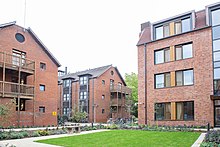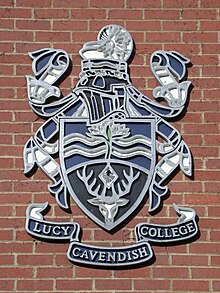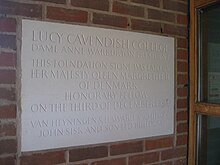Lucy Cavendish College, Cambridge
A major contributor to this article appears to have a close connection with its subject. (August 2023) |
| Lucy Cavendish College | |
|---|---|
| University of Cambridge | |
 Lucy Cavendish College Bertram, De Brye and New Build view from the courtyard | |
 Arms of Lucy Cavendish College | |
| Scarf colours: eight alternating stripes of black and blue of varying width, with wide black and narrow blue stripes transitioning towards narrow black and wide blue stripes across the face of the scarf | |
| Location | Lady Margaret Road (map) |
| Coordinates | 52°12′40″N 0°06′36″E / 52.2112°N 0.1101°E |
| Abbreviation | LC[1] |
| Established | 1965 |
| Named after | Lucy Cavendish |
| Gender | Mixed from 2021 onwards[2] |
| Age restriction | All ages from 2020[2] |
| Sister college | Regent's Park College, Oxford |
| President | Madeleine Atkins |
| Undergraduates | 367 (2022–23) |
| Postgraduates | 486 (2022–23) |
| Endowment | £17.6m (2021)[3] |
| Website | www |
| Students' union | www |
| Map | |

Lucy Cavendish College is a constituent college of the University of Cambridge.
The college is named in honour of Lucy Cavendish (1841–1925), who campaigned for the reform of women's education.[4]
History
[edit]The college was founded in 1965 by female academics of the University of Cambridge who believed that the university offered too few and too restricted opportunities for women as either students or academics. Its origins are traceable to the Society of Women Members of the Regent House who are not Fellows of Colleges (informally known as the Dining Group) which in the 1950s sought to provide the benefits of collegiality to its members who, being female, were not college fellows.[5] At the time there were only two women's colleges in Cambridge, Girton and Newnham, insufficient for the large and growing numbers of female academic staff in the university.[6]
The college was named in honour of Lucy Caroline Cavendish, a pioneer of women's education and the great aunt of one of its founders, Margaret Braithwaite.[4] First formally recognised as the Lucy Cavendish Collegiate Society, it moved to its current site in 1970, received consent to be called Lucy Cavendish College in 1986, and gained the status of a full college of the university by Royal Charter in 1997.[7]
The first president of the college, from 1965 to 1970, was Anna McClean Bidder, one of the founding members of the Dining Group and a zoologist specialising in cephalopod digestion;[6] this accounts for the presence of the nautilus shell in the college coat of arms.[8] She was succeeded by Kate Bertram until 1979, Phyllis Hetzel (Lady Bowden), Dame Anne Warburton, Baroness Perry of Southwark, Dame Veronica Sutherland, Janet Todd and Jackie Ashley. The current and ninth president of Lucy Cavendish is Madeleine Atkins, who took up the post in 2018.
With effect from October 2021, Lucy Cavendish has admitted both women and men from the standard university age. The college gave as its primary reason for the change "to grow graduate and undergraduate numbers to support the University and the other colleges in making more places available for excellent students from under-represented backgrounds."[9] The mission of the college was to open the Cambridge door to talented and exceptional students from under-represented and non-traditional backgrounds. Lucy Cavendish, uniquely in Cambridge, became broadly representative in its UK student body of the UK's national society.[10] On 4 December 2019 the college appointed its first male fellows.[11] In the 2022 admission cycle, Lucy Cavendish became the first University of Cambridge college to admit more than 90% of its undergraduates from state schools.[12]
College site
[edit]For the first few years of the college's existence it occupied rooms first in Silver Street and then in Northampton Street. In 1970 it moved to its current site on the corner of Madingley Road and Lady Margaret Road, near Westminster College and St John's College, which had provided some of the land.[13]
In 1991 the college bought Balliol Croft, a neighbouring house to its grounds and former home of the economist Alfred Marshall and his wife Mary Paley Marshall, with whom he wrote his first economics textbook. The building was renamed Marshall House in his honour and used for student accommodation until 2001 when it was converted back to its original layout and used as the President's Lodge.[14] Meanwhile, the majority of the college's buildings, including Warburton Hall and the library, were completed in the 1990s.[13]
The college is primarily situated on a site just north-west of central Cambridge bounded by Madingley Road and Lady Margaret Road. It is currently based around three converted 19th-century villas and a new eco-friendly and accessible Passivhaus building, with facilities including student accommodation, porters’ lodge, library, teaching rooms, dining hall, gym, social spaces and a large café/bar. The new accommodation building meets and exceeds the Passivhaus standard and 100% of the college's electricity is supplied by renewables. In 2022 the college received the Platinum Award for Green Impact, the highest award offered by the United Nations’ programme for environmentally and socially sustainable practice.[15]
There is on-site accommodation for 235 students with a further 98 rooms (including 10 flats) owned by the college near its main site, primarily at its new student centre at 100 Histon Road which was opened in 2014. In order to provide more accommodation, the college also rents neighbouring properties from St John's College and at Mount Pleasant Halls, which together provide a further 114 rooms and flats.

Student body
[edit]Lucy Cavendish has over 900 students, approximately 40% of whom are undergraduates and 60% graduates.[16] Students originate from over 85 different countries, making it a distinctly international college. The college website states that "Students from every corner of the UK mix with students from around the world. Students with 'Access' qualifications interact with students who have studied for A-levels and the International Baccalaureate.
The 2020 intake had 74% of new entrants that came from under-represented groups, compared to an average across the University of 64%. The 2021 intake has recorded an intake of 78% of new UK students from state schools or FE colleges compared to the University average of 70%. The 2022 intake has recorded an intake of 91.1% of new UK students from state schools or FE colleges compared to the University average of 72.5%.[17]
Lucy Cavendish students are also called "Lucians".
Academic performance
[edit]The percentage of undergraduate/postgraduate students achieving 2.1 or 1st class honours degrees was 97% of all students eligible during 2020.
Clubs and societies
[edit]Students are encouraged to join some of the hundreds of clubs and societies across the university and in their academic department, in order to have a healthy life balance that makes them more successful as students and brings them friendships and contacts they wouldn't otherwise have had. There is currently an art society, two choirs, a sewing and knitting society, a student magazine, the Lucy Cavendish College Boat Club, and teams for badminton, football and netball. There are societies based on the course (Tripos) such as Lucy Lawyers and the VetMed Society, with their programmes of talks, visits and social events.
Lucy Cavendish Fiction Prize
[edit]The college hosts an important annual national prize for fiction, the Lucy Cavendish Fiction Prize, open to women novelists over the age of 18 years who have not yet been published. It was founded by Janet Todd. The Prize has launched numerous literary careers with a number of shortlisted writers seeing commercial success. Alongside the Fiction Prize, the college has run writing short courses with subsidies for those from low-income backgrounds, runs writing prizes for current students and prospective students, and supported the establishment of the innovative virtual “Lucy Writers’ Platform” that provides opportunities for budding non-fiction writers, journalists, and others to build a profile.[18] Fiction Prize winners include Gail Honeyman Eleanor Oliphant Is Completely Fine and Claire Askew.[19]
List of presidents
[edit]| Name | Term of office | |
|---|---|---|
| 1st President | Anna McClean Bidder | 1965-1970 |
| 2nd President | Kate Bertram | 1970-1979 |
| 3rd President | Phyllis Hetzel | 1979-1984 |
| 4th President | Dame Anne Warburton | 1985-1994 |
| 5th President | Pauline Perry, Baroness Perry of Southwark | 1994-2001 |
| 6th President | Dame Veronica Sutherland | 2001-2008 |
| 7th President | Janet Todd OBE | 2008-2015 |
| 8th President | Jackie Ashley | 2015-2018 |
| 9th President | Dame Madeleine Atkins | since 2018 |
Notable alumnae
[edit]

- Noeleen Heyzer, Under-Secretary-General of the United Nations and executive director of UNIFEM
- Rosena Allin-Khan, Member of Parliament for Tooting since 2016.[20]
Honorary Fellows
[edit]- Jackie Ashley
- Carol M. Black
- Margaret Burbidge
- Shami Chakrabarti (2 March 2017)[21]
- Jane Clarke
- Dame Judi Dench
- Janet Neel Cohen, Baroness Cohen of Pimlico
- Anna Ford
- Edwina Dunn
- Cynthia Glassman
- Sophie Hannah
- Helena Kennedy, Baroness Kennedy of The Shaws
- Queen Margrethe of Denmark
- Martina Navratilova
- Dame Anne Owers
- Pauline Perry, Baroness Perry of Southwark
- Nirmala Rao
- Alison Richard
- Dame Stella Rimington
- Sarah Sands
- Ali Smith
- Veronica Sutherland
- Dame Cath Tizard
- Janet Todd
- Sandi Toksvig
- Claire Tomalin
References
[edit]- ^ University of Cambridge (6 March 2019). "Notice by the Editor". Cambridge University Reporter. 149 (Special No 5): 1. Retrieved 20 March 2019.
- ^ a b "History | Lucy Cavendish".
- ^ "Annual reports and Financial Statements for Lucy Cavendish College". Lucy Cavendish College, Cambridge. Retrieved 3 August 2018.
- ^ a b Renfrew, Jane M. "Who was Lucy Cavendish?". Rooms of Our Own – Lucy Cavendish College. Archived from the original on 7 July 2011. Retrieved 1 March 2012.
- ^ "Papers of the Dining Group 1951–1966". London Metropolitan University.
- ^ a b Warburton, Anne (9 October 2001). "Anna Bidder obituary". The Independent. London.[dead link]
- ^ "Statutes for Lucy Cavendish College in the University of Cambridge". Lucy Cavendish College. 1997. Retrieved 1 March 2012.
- ^ "The Lucy Cavendish College Shield of Arms". Lucy Cavendish College. Retrieved 24 February 2012.
- ^ Bayliss, Chloe (11 March 2019). "Lucy Cavendish to become mixed-gender college, admitting students from age 18". Varsity (Press release). Cambridge, UK. Retrieved 12 March 2019.
- ^ "Annual reports and Financial Statements for Lucy Cavendish College". Lucy Cavendish College, Cambridge. Retrieved 3 August 2018.
- ^ "Lucy Cavendish welcomes new members to the Fellowship" (Press release). Lucy Cavendish College. 5 December 2019. Retrieved 8 December 2019.
- ^ "Lucy Cavendish becomes first Cambridge college to admit more than 90% of undergraduates from state schools". Cambridge Independent. 20 September 2022. Retrieved 20 September 2022.
- ^ a b "Lucy Cavendish College Site and Buildings" (PDF). Lucy Cavendish College. Archived from the original (PDF) on 27 September 2011. Retrieved 14 September 2014.
- ^ "Cambridge 2000 – Lucy Cavendish College: Madingley Road: Marshall House (Balliol Croft)". Cambridge 2000.
- ^ "Sustainability at Lucy". Lucy Cavendish College.
- ^ "Supporting Students". Lucy Cavendish College.
- ^ "College admits its most diverse undergraduate intake ever". Lucy Cavendish College.
- ^ "Lucy Cavendish Fiction Prize". The Lucy Cavendish College Fiction Prize.
- ^ "Get inspired | Lucy Cavendish". www.lucy.cam.ac.uk.
- ^ "Lucy Cavendish alumna elected as Labour MP for Tooting" (Press release). Lucy Cavendish College. 29 June 2016. Retrieved 12 March 2019.
- ^ "Shami Chakrabarti made Honorary Fellow of Lucy Cavendish". The Cambridge Student. 1 March 2017.
- ^ "Fellows - Lucy Cavendish". Lucy Cavendish College - University of Cambridge.



